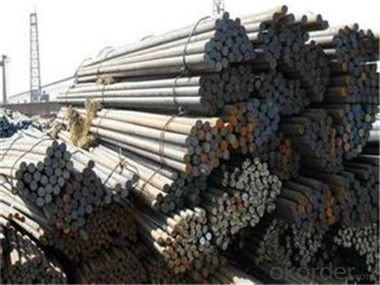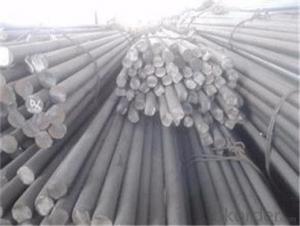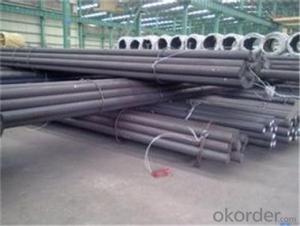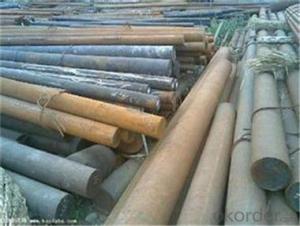Hard Chrome Carbon Steel Bar with Good Quality-CNBM
- Loading Port:
- Tianjin
- Payment Terms:
- TT OR LC
- Min Order Qty:
- 666 m.t.
- Supply Capability:
- 2000000 m.t./month
OKorder Service Pledge
OKorder Financial Service
You Might Also Like
Description of steel round bar:
1.Diameter 80 to 800 mm
2.Black or Bright surface
Festures of steel round bar:
4340 Forged Round Steel Bar
1.Dia 80-800mm Length:2000-13000mm or as required
2.Technique:Forged
3.Delivery Time:45 days
Specifications of steel round bar:
Description |
Carbon Steel Rod/Carbon Steel Bar,carbon steel rod,carbon steel shaft,mild steel bar, mild steel shaft,ms bar | |
Material | ASTM | 1005,1006,1008,1010,1015,1020,1025,1030,1035,1040,1045,1050,1055,1060,1065,1070,1080,1084, 1016,1022 |
DIN | Ck10,Ck15,Ck22,Ck25,Ck30,Ck35,Ck40,Ck45,Ck50, 30Mn4,40Mn4 | |
BS | 040A04,095M15,045M10,080A40,045M10,080M50 | |
Standard | GB/T799,ASTM A29,A108,A321,A575,BS970,DIN1652,JIS G4051 | |
Section shape |
Round | |
Length |
As your required | |
Application | Carbon steel rod applies to chemical industry, shipping industry, manufacturing industry,construction,decorate Industry,electric power, pump shafts, sanitary wares,furniture handles,boiler,high temperature resistant,low temperature resistant, corrosion resistant. | |
Images of steel round bar:

FAQ:
1. What is your package?
Packing situation: standard seaworthy packing or as customer required.
2. How long is the lead time?
Delivery time: 45 days after order confirmed.
3. What payment term do you accept?
Payment: T/T or L/C at sight.
- Q:Can steel round bars be coated or painted?
- Yes, steel round bars can be coated or painted. Coating or painting steel round bars serves several purposes, such as preventing corrosion, enhancing aesthetics, and providing additional protection against environmental factors. Coatings and paints can be applied to steel round bars using various methods, including powder coating, electroplating, or wet paint application. These processes involve preparing the surface of the steel round bar by removing any existing rust or contaminants, followed by the application of the chosen coating or paint. The type of coating or paint used will depend on the specific requirements of the steel round bars, such as the intended use, environmental conditions, and desired appearance. Coating or painting steel round bars can significantly extend their lifespan, improve their visual appeal, and ensure their durability in various applications.
- Q:Can steel round bars be used for making architectural or decorative elements?
- Certainly, steel round bars are an excellent choice for crafting architectural or decorative elements. These bars possess numerous advantages that render them perfect for such applications. To begin with, steel is an enduring and robust material, guaranteeing the longevity and stability of the architectural or decorative element. Moreover, steel round bars can be easily manipulated and personalized to fashion intricate designs, making them adaptable for various architectural styles and aesthetics. These bars can be employed to produce features such as railings, balustrades, ornamental gates, sculptures, or even pieces of furniture. Additionally, the sleek and polished surface of the steel round bars enhances their visual allure, rendering them ideal for decorative purposes. Furthermore, steel is resistant to corrosion, ensuring that the architectural or decorative element will remain intact and visually pleasing even in outdoor or high-moisture environments. In conclusion, steel round bars are a fitting and sought-after option for creating architectural or decorative elements owing to their durability, versatility, and visual appeal.
- Q:What are the different types of steel used in round bars?
- There are several types of steel commonly used in round bars, including carbon steel, alloy steel, stainless steel, and tool steel.
- Q:Can steel round bars be used for making railway tracks?
- No, steel round bars are not suitable for making railway tracks. Railway tracks require specially designed steel rails that are shaped to provide stability and support heavy loads.
- Q:What is the difference between a polished and a hot rolled steel round bar?
- The main difference between a polished and a hot rolled steel round bar lies in their manufacturing processes and the resulting surface finish. Hot rolled steel round bars are produced by heating a steel billet or ingot to high temperatures and then rolling it into the desired shape, typically a round bar. This process results in a rough and uneven surface finish with mill scale and imperfections. The hot rolled bars are generally used for applications where surface finish is not critical, such as structural components, machinery parts, and construction materials. On the other hand, polished steel round bars undergo additional processing to achieve a smooth and shiny surface finish. After the hot rolling process, the bars are processed through various grinding and polishing techniques to remove the mill scale, surface imperfections, and achieve a uniform finish. This results in a refined and aesthetically pleasing surface that is suitable for applications where appearance and visual appeal matter, such as decorative items, furniture, and architectural components. In addition to the surface finish, the mechanical properties of the two types of steel round bars can also differ. The hot rolled bars generally have a rougher surface and may exhibit some residual stresses, while the polished bars have a smoother surface and reduced internal stresses. However, the overall mechanical properties, such as strength and hardness, are primarily determined by the grade and composition of the steel used, rather than the manufacturing process or surface finish. In summary, the difference between a polished and a hot rolled steel round bar lies in their surface finish. Hot rolled bars have a rough and uneven surface with mill scale and imperfections, while polished bars undergo additional processing to achieve a smooth and shiny finish. The choice between the two depends on the specific application and the desired appearance of the final product.
- Q:What are the typical dimensions of a steel round bar?
- The typical dimensions of a steel round bar vary depending on the intended application and industry standards. However, common sizes range from 1/4 inch to 12 inches in diameter, with lengths usually ranging from 10 to 20 feet.
- Q:What is the carbon content in steel round bars?
- The carbon content in steel round bars typically ranges from 0.15% to 0.60% depending on the grade and specific requirements.
- Q:Are steel round bars suitable for use in the marine industry?
- Yes, steel round bars are suitable for use in the marine industry. Steel is known for its strength, durability, and corrosion resistance, making it an excellent choice for marine applications. Steel round bars are commonly used in shipbuilding, offshore structures, and other marine equipment due to their ability to withstand harsh weather conditions, saltwater exposure, and heavy loads. Additionally, steel's versatility allows for easy fabrication and customization to meet specific requirements in the marine industry.
- Q:Can steel round bars be extruded?
- Steel round bars cannot be extruded; instead, they are typically produced through a different process called hot rolling. In hot rolling, a cylindrical billet is heated and passed through a series of rollers to achieve the desired diameter and length. Extrusion, on the other hand, is a manufacturing process that involves forcing material through a die to create specific shapes or profiles. While steel can be extruded into various shapes such as tubes, channels, or angles, round bars are not typically produced in this way.
- Q:What are the different types of steel round bar alloys for improved strength?
- Various steel round bar alloys are known for their enhanced strength. These alloys are developed by adding different elements to the steel composition, resulting in varying properties and strengths. Carbon steel is a commonly used alloy for increased strength. It contains a higher carbon content, which enhances its strength and hardness. Carbon steel round bars are widely utilized in applications that require high strength, such as construction, automotive, and machinery. Stainless steel is another alloy known for its corrosion resistance and high strength. Stainless steel round bars are frequently employed in environments where corrosion is a concern, such as marine applications, food processing, and chemical plants. Alloy steel is a different category that offers improved strength. It is created by incorporating elements like chromium, molybdenum, and nickel into the composition. Alloy steel round bars are commonly used in industries that necessitate high strength and durability, such as aerospace, oil and gas, and power generation. Tool steel is an additional alloy that provides enhanced strength and toughness. Tool steel round bars are specifically designed for machining and cutting applications, where high wear resistance and hardness are crucial. Lastly, there are specialty alloys such as nickel alloy and titanium alloy round bars, which offer exceptional strength and unique properties for specific applications. Nickel alloy round bars are often utilized in industries such as aerospace, chemical, and nuclear, while titanium alloy round bars are commonly found in aerospace, medical, and automotive industries. In conclusion, carbon steel, stainless steel, alloy steel, tool steel, and specialty alloys are the different types of steel round bar alloys that provide improved strength. Each of these alloys possesses its own unique properties and applications, offering a wide range of options for industries that require high strength materials.
1. Manufacturer Overview |
|
|---|---|
| Location | |
| Year Established | |
| Annual Output Value | |
| Main Markets | |
| Company Certifications | |
2. Manufacturer Certificates |
|
|---|---|
| a) Certification Name | |
| Range | |
| Reference | |
| Validity Period | |
3. Manufacturer Capability |
|
|---|---|
| a)Trade Capacity | |
| Nearest Port | |
| Export Percentage | |
| No.of Employees in Trade Department | |
| Language Spoken: | |
| b)Factory Information | |
| Factory Size: | |
| No. of Production Lines | |
| Contract Manufacturing | |
| Product Price Range | |
Send your message to us
Hard Chrome Carbon Steel Bar with Good Quality-CNBM
- Loading Port:
- Tianjin
- Payment Terms:
- TT OR LC
- Min Order Qty:
- 666 m.t.
- Supply Capability:
- 2000000 m.t./month
OKorder Service Pledge
OKorder Financial Service
Similar products
New products
Hot products
Related keywords































